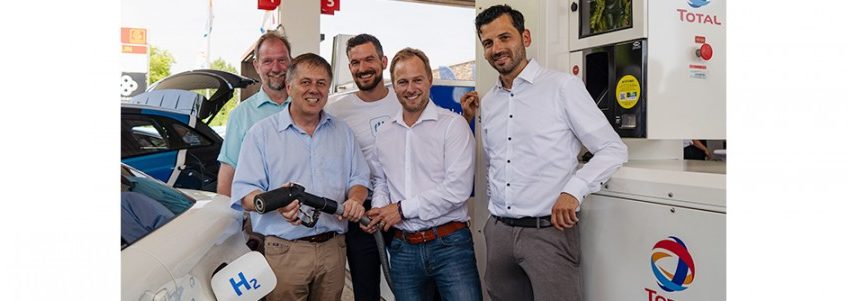With the opening of a new hydrogen filling station in Duisburg on the TOTAL Autohof “Am Schlütershof” the company H2 MOBILITY is further expanding the German hydrogen filling station network. There are now a total of 71 public filling stations in Germany, 16 of them in North Rhine-Westphalia. Germany’s most populous state thus underscores its leading role in the market launch of this innovative and environmentally friendly form of electromobility.
The hydrogen filling station in Duisburg was built by H2 MOBILITY, a joint venture of Air Liquide, Daimler, Linde, OMV, Shell and TOTAL, which has set itself the goal of operating 100 filling stations in Germany by the end of the year. This would be an important step towards the nationwide supply of hydrogen and the market launch of hydrogen vehicles. The technology for the plant at the TOTAL Autohof was supplied by Air Liquide. The H2 station is state of the art. Its operation by the driver is intuitive; refuelling is similar to that of conventional vehicles. The system stores around 200 kilograms of hydrogen – enough to refuel 40 to 50 vehicles a day.
Since 2002, TOTAL Germany has been involved in research and pilot projects to develop the hydrogen infrastructure and currently has 21 hydrogen refuelling points in its filling station network. “By expanding the network, we are jointly creating the basis for technological diversity in electromobility and for the market launch of hydrogen vehicles in the passenger car sector and, in the future, also for commercial vehicles,” explained Bruno Daude-Lagrave, Managing Director of TOTAL Deutschland GmbH.
“H2 MOBILITY continues to expand the hydrogen filling station network in Germany. This year we are opening a filling station every 10 days or so, ensuring that more and more people and companies can switch to hydrogen without major constraints,” said Nikolas Iwan, Managing Director of H2 MOBILITY Deutschland, at the opening ceremony.
Frédéric Minaud, Managing Director of Air Liquide Advanced Technologies GmbH: “Hydrogen is one of the best solutions to achieve the goals of the Paris Climate Change Agreement. reach. It has the potential to efficiently decarbonize the transport sector, which is one of the major sources of pollution in our cities. Air Liquide is proud to be involved in the development of Europe’s largest hydrogen infrastructure and thus the prerequisite for the roll-out of fuel cell vehicles in Germany.”
Electromobility with hydrogen plays a central role for environmentally friendly transport of the future, both for passenger cars and commercial vehicles. Vehicles refuel with hydrogen similar to natural gas. On board of the vehicle, a fuel cell generates electricity from the hydrogen, which then drives an electric motor. With five minutes of refuelling time, ranges of more than 500 kilometers are possible. Since hydrogen can be produced by electrolysis from water with renewable electricity, it is also the central link between the energy turnaround and the traffic turnaround.
The hydrogen station in Duisburg is funded by the European Commission in the Trans-European Transport Network (TEN-T CEF) with 625,000 Euros in the Connecting Hydrogen Refuelling Stations (COHRS) project. The opening of the filling station is part of the “Hydrogen Week in North Rhine-Westphalia”. Further meetings and more information under www.h2.live/woche-des-wasserstoffs-2019.
Following the opening, the Centre for Fuel Cell Technology (ZBT) presented the hydrogen test field with laboratories and filling station at the ZBT in Carl-Benz-Straße in the presence of Prime Minister Armin Laschet. A flexible test field was installed here, from the production of hydrogen by electrolysis via various compressor stages and cooling through to delivery, in which tests can be carried out on safety and economy as well as on filling station concepts and refuelling options for cars, buses and trucks. In joint research projects with cooperation partners, components and systems for the hydrogen infrastructure can be developed and tested. This development was supported by projects of the federal government and the state of NRW.


